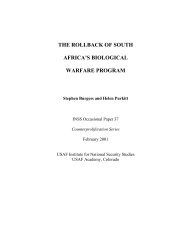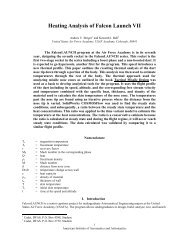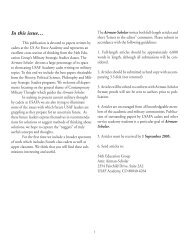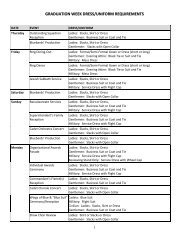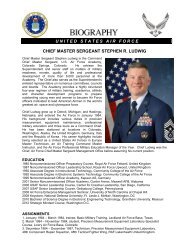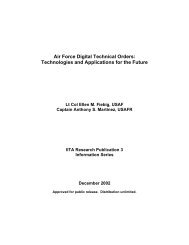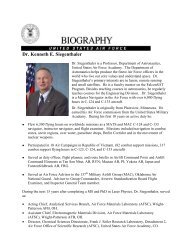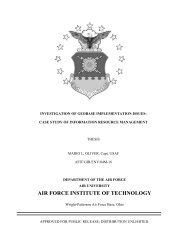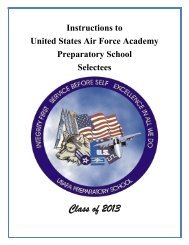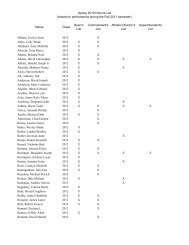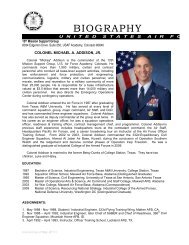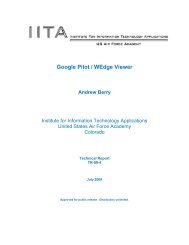Military Professionalism - United States Air Force Academy
Military Professionalism - United States Air Force Academy
Military Professionalism - United States Air Force Academy
You also want an ePaper? Increase the reach of your titles
YUMPU automatically turns print PDFs into web optimized ePapers that Google loves.
less likely that things would change in this case. Officers have an ethical obligation to<br />
make their concerns known to civilian leaders but this should be done in private. Also,<br />
officers are most influential before a decision is made. Once the decision is made, it is<br />
unlikely that it will be changed due to public criticism from retired officers.<br />
Margolick, David. “The Night of the Generals.” Vanity Fair 560 (Apr. 2007): 246.<br />
The six retired generals who stepped forward to publicly attack Secretary of Defense<br />
Donald Rumsfeld's handling of the Iraq war had to overcome a culture of reticence based<br />
on civilian control of the military. These six men individually called for Sec. Rumsfeld’s<br />
resignation. Some scholars of military-civilian affairs said that the six imperiled civilian<br />
control, undermined military mores and morale, and jeopardized the military meritocracy<br />
and the trust between senior and junior officers. Critics said that the time for these men<br />
to have spoken out was while they were still in uniform, through the chain of command.<br />
Moten, Matthew. “Strengthening the Political-<strong>Military</strong> Relationship.” Foreign<br />
Affairs 89.5 (Sept./Oct. 2010): 2-8.<br />
In 2006, six retired generals publicly called for Rumsfeld to resign, and in 2008, multiple<br />
retired officers spoke against the DOD on national television. By engaging in such<br />
activities which are not allowed while on active duty, these officers could undermine<br />
ongoing military campaigns when they provide advice without knowing the actual<br />
situation in theater. These former officers should distance themselves from the armed<br />
services and make it clear that they speak as private citizens and in no way represent the<br />
views of the military.<br />
Endorsement of political candidates<br />
Becker, William R. Retired Generals and Partisan Politics: Is a Time-out Required?<br />
Strategy Research Project. Carlisle Barracks: U.S. Army War College, 2001.<br />
http://handle.dtic.mil/100.2/ADA391263<br />
Retired general officer participation in partisan politics is increasing, and many in the<br />
military and civilian sector believe this participation will politicize the military. The<br />
<strong>United</strong> State military has a mixed history of apolitical behavior. This was proper when<br />
the <strong>United</strong> <strong>States</strong> was isolated in its early history, when there were an adequate number of<br />
veterans in governmental positions, and when the survival of the nation was at stake<br />
during the Cold War. Today, the <strong>United</strong> <strong>States</strong> is the world's only superpower, there are<br />
fewer veterans representing the military's interests in government, and future national<br />
security strategy must contend with a vague, uncertain, complex, and ambiguous world.<br />
While the active duty military must stay non-partisan, retired general officer participation<br />
in partisan politics will ensure national security strategy issues take a proper role in<br />
public debate. The support for a candidate by a retired general officer should be provided<br />
65




